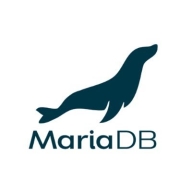

MariaDB and Oracle Database In-Memory compete in the database category, each offering unique strengths. Oracle has the upper hand in handling demanding data queries due to its advanced analytical capabilities and ecosystem integration.
Features: MariaDB provides open-source flexibility, easy setup, and great scalability with PL/SQL compatibility. Oracle Database In-Memory offers advanced analytics, columnar storage, and high performance tailored for data warehousing.
Room for Improvement: MariaDB could enhance features, system compatibility, and security measures, with a call for better non-relational data support. Oracle Database In-Memory users suggest more flexible pricing, easier migration, and improved graphical interfaces.
Ease of Deployment and Customer Service: MariaDB supports versatile deployments across cloud environments, backed by community-driven support. Oracle Database In-Memory also provides varied deployment support with comprehensive formal assistance, albeit sometimes costly and lacking localization.
Pricing and ROI: MariaDB offers cost-effectiveness with a free open-source edition, providing significant savings. Oracle Database In-Memory's structured licensing supports enterprises with higher costs but offers ROI justified by its scalability and analytics efficiency.


MariaDB is an open source relational database created by the original founders of MySQL. It is considered one of the most popular and trusted database servers throughout the world. MariaDB is a valued component found in most cloud offerings and is the default in many Linux tools. It is also widely used by Wikipedia, WordPress, and Google, among other well-known sites. Maria DB easily melds data into concise information from a vast array of applications, such as banking, online shopping, websites, and more.
MariaDB was originally created to improve MySQL performance. It is the most widely chosen database server due to the solution being super fast, robust, user-friendly, and easily scalable. MariaDB also offers a substantial ecosystem of plugins, storage engines, and numerous other valuable tools that make it very attractive for a significant offering of use cases.
The solution’s newest functionalities include compatibility with Oracle Database and Temporal Data Tables, and advanced clustering with Galera Cluster 4, which make it easier for users to research data history from any point in the past. Additionally, the most recent versions include JSON and GIS features. MariaDB is committed to staying an open source solution.
MariaDB Features
Reviews from Real Users
Faustine C., Engineering Supervisor- Corporate Data Solutions and Services at TZ Telecoms Corporation, shares, “The software provides a lot of information on what is happening inside the database. For most performance parameters it is easy to know if something is not right in the configuration or optimization which helps engineers take remedial fine-tuning measures. For example, if the database is underperforming it is easy to know which performance parameter can be adjusted to handle the workload. It is difficult to troubleshoot database issues if many performance parameters can not be monitored or debugged which is the case with some database management systems. It provides great monitoring of data storage, processing, and performance stability which is really important for real-time data storage and processing. It's a user-friendly product.”
A PeerSpot user who is a Senior Engineer at a tech services company relates, “ The solution's high availability is its most valuable aspect. We have found the product to be stable and the initial setup is pretty simple. I'd rate the solution at a ten out of ten. I'm very happy with it overall. I would recommend the solution to others. It's easy to find details about the product online and to learn about it.”
Oracle Database In-Memory transparently accelerates analytics by orders of magnitude while simultaneously speeding up mixed-workload OLTP. With Oracle Database In-Memory, users get immediate answers to business questions that previously took hours.
Oracle Database In-Memory delivers leading-edge in-memory performance without the need to restrict functionality, or accept compromises, complexity and risk. Deploying Oracle Database In-Memory with any existing Oracle Database compatible application is as easy as flipping a switch - no application changes are required. Oracle Database In-Memory is fully integrated with the Oracle Database’s renowned scale-up, scale-out, storage tiering, availability, and security technologies making it the most industrialstrength offering on the market.
The ability to easily perform real-time data analysis together with real-time transaction processing on all existing applications enables organizations to transform into Real-Time Enterprises that quickly make data-driven decisions, respond instantly to customer demands, and continuously optimize all key processes.
For more information on Oracle Database In-Memory, visit Oracle.com
We monitor all Relational Databases Tools reviews to prevent fraudulent reviews and keep review quality high. We do not post reviews by company employees or direct competitors. We validate each review for authenticity via cross-reference with LinkedIn, and personal follow-up with the reviewer when necessary.